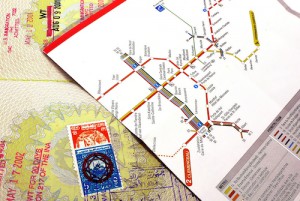 It doesn't matter if this is your first time overseas or your hundredth. Traveling abroad can be an immensely satisfactory experience, helping you become a more well-rounded and cultured individual. You will step outside of your comfort level to interact with new people, languages, social etiquette, and locations. However, you will want to be prepared when things go wrong-you might get lost in a foreign country Almost every single person can be better prepared when traveling abroad, and your next trip is the perfect time to optimize your planning. Maybe you've lucked out so far or maybe you've already learned a few hard lessons. Either way, prepping is key and can help keep you safe while making the most of your trip.
It doesn't matter if this is your first time overseas or your hundredth. Traveling abroad can be an immensely satisfactory experience, helping you become a more well-rounded and cultured individual. You will step outside of your comfort level to interact with new people, languages, social etiquette, and locations. However, you will want to be prepared when things go wrong-you might get lost in a foreign country Almost every single person can be better prepared when traveling abroad, and your next trip is the perfect time to optimize your planning. Maybe you've lucked out so far or maybe you've already learned a few hard lessons. Either way, prepping is key and can help keep you safe while making the most of your trip.
Here are the top key things to do before boarding your flight. Some of them might seem a bit excessive, but it's all "Just in case" the worst happens. It's better to be over-prepared than wishing otherwise in a tough situation.
1. Get an attorney in your corner
Most people don't have an attorney unless they're a well established business or it's already too late. Building a professional relationship with a lawyer is a great way to be proactive, so that you can count on them once you get into a bind. You don't need to have a lawyer on retainer, but connecting with one and having contact information to provide an embassy or to loved ones back home is important. Research reputable firms in your area and set up a consultation as a meet and greet.
2. Actually get travel insurance
You know you should have it, and it's very cheap, but you just haven't gotten around to it. Do it now, because if you have to be hospitalized abroad there's no such thing as too much coverage. Your health insurance policy might cover some part of your treatment overseas, but travel insurance can optimize it greatly. Travel insurance plans will also sometimes cover expenses, so that you can get some money back if you must cancel a flight or hotel booking. This can help you save money in the long run if you are unable to travel due to unexpected reasons, such as health, weather, or political conditions.
3. Put copies of identification and tickets in cloud storage
In addition to making copies of your passport and visas, make sure it's uploaded to cloud storage. There are many free options such as Google Drive and if you lose these documents, they're much easier to replace when you have a copy. If you lose all your luggage, including the hard copies, you need a backup. You should also keep scanned copies of your flight, bus, and train tickets just in case you lose the hard copies. Keep these documents saved to your mobile camera roll, so that you can also access them when you do not have a Wi-Fi or cellular connection.
4. Get a Skype phone number
For less than $50 per year, you can get a US phone number (or phone number based from many countries) on Skype so that loved ones back home are basically calling a national number that you can answer wherever you're logged into Skype. This avoids those pesky calling cards and gives you a clearer connection in an emergency. You can connect to Skype for free by taking your computer or mobile device to an area with free Wi-Fi.
5. Research laws in the country
There can be some seemingly strange laws in other countries that are easy for Americans to break by accident. Breaking laws in another country can get into you into a significant amount of international legal trouble. Know what you're getting into before you arrive.
Shared by gilbertbourke.com







